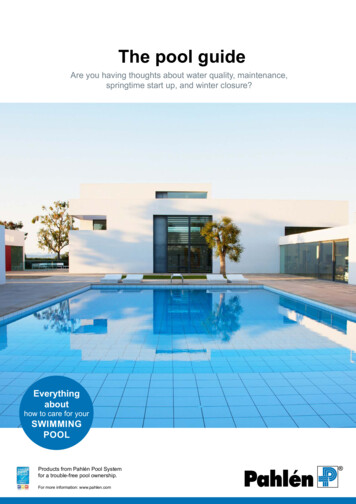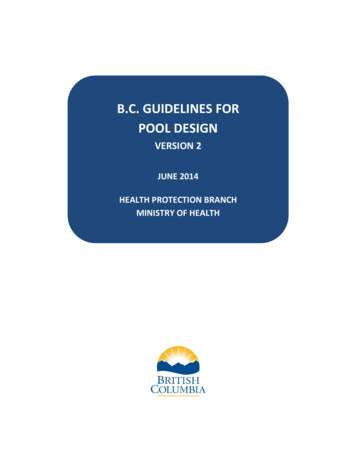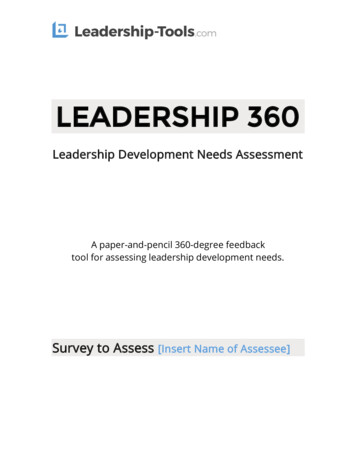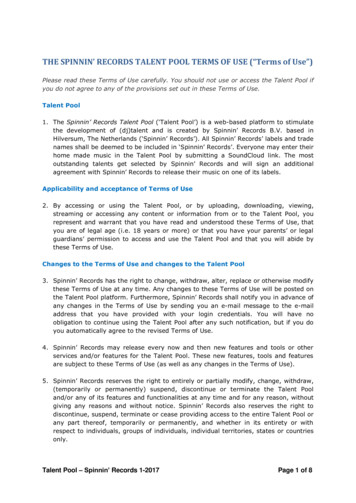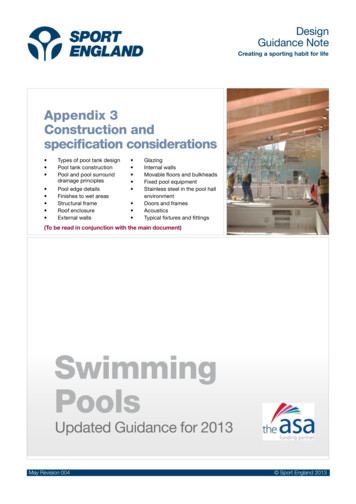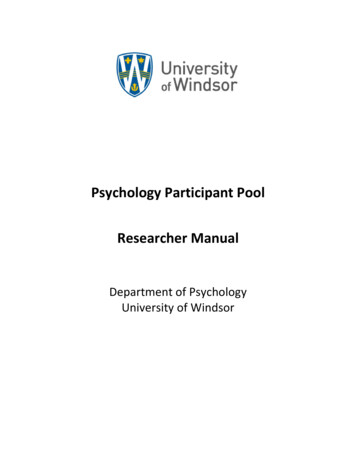
Transcription
Psychology Participant PoolResearcher ManualDepartment of PsychologyUniversity of Windsor
Copyright 2018 by the Department of Psychology, University of Windsor.Fourth Edition-RevisedPublished byDepartment of PsychologyUniversity of Windsor401 Sunset Ave.Windsor, ONCanadawww.uwindsor.ca/psychologyWeb-based human subject pool management software developed and hosted by Sona Systems(www.sona-systems.com)First Edition AuthorsAlan Scoboria (Committee Chair)Patti FritzSecond Edition AuthorsGreg Chung-Yan (Committee Chair)Stephanie FisicoGiavana JonesAlan ScoboriaThird Edition AuthorsAlan Scoboria (Committee Chair)Sabrina FreundGiavana JonesMia SisicGreg Chung-YanFourth Edition AuthorsPatti Fritz (Committee Chair)Mia SisicSabrina FreundLauren O’DriscollJillian GlasgowFourth Edition-Revised AuthorsLori Buchanan (Committee Chair)Carolyn RautiTara McAuleyJillian GlasgowAll policies within the fourth edition-revised supersede the policies in the previous editions.[ii]
Table of ContentsResearcher Policies .3Purpose and right of access to the participant pool .3Participant pool policy and procedures are approved by the University Research Ethics Board (REB) .3Conflicts of interest .4Violations of participant pool policies .4Before you Begin .4Researchers cannot offer anonymity to participants .5Access to participants .5Compensation through the pool .5Language for Research Ethics Board (REB) Applications .6Day-to-Day Researcher Use of the Participant Pool.7Partial completion and Failure to complete studies .7Inclusion of screening questions .9Participant cancellations / no-shows . 10Dates during the term . 10Study signup throughout the term . 10Registering as a Researcher and Registering Studies in the System . 11Returning researchers . 11New researchers . 11Registering a study in the system . 12Adding timeslots to a study . 20Deleting sessions . 23Assigning credits . 23Study location . 24“Visible?” . 24Rescheduling . 24Do not allow walk-ins . 25Updating a study in the system . 25Conducting research across terms . 25Specific situations . 25Online questionnaires . 26[1]
Ethical Guidelines for Pool Researchers who are also Course Instructors / GAs / TAs . 27Specific Guidelines for Honours Undergraduate Students . 29Violations of the Pool SOP . 30Pool from the Participant Perspective . 31Application to Recruit Research Participants through the Psychology Research Participant Pool.1Psychology Research Participant Pool REB Revision and Extension Form .1Standard Screening Questions .2Participant Pool Ad Template .5[2]
Researcher PoliciesPurpose and right of access to the participant poolThe participant pool facilitates the convenient collection of research data using undergraduatepsychology students. It is a service provided by the psychology department to researchers within thedepartment (faculty, graduate students, and honours students). It is a privilege, and not a right, to usethe pool. Failure to comply with participant pool regulations may result in temporary or permanentloss of access to the pool as a researcher.The pool is the only way to access students in Department of Psychology courses for the purpose ofconducting research. However, the participant pool is not the only way in which research may beconducted at the university. Researchers with special recruitment needs for which the pool is not idealare encouraged to seek other methods of recruitment. The participant pool committee reserves theright to deny researchers the use of the participant pool if they deem that their proposed researchdoes not conform to the purpose and/or function of the participant pool.Participant pool policy and procedures are approved by the University Research Ethics Board (REB)By indicating to the Research Ethics Board (REB) that you are using the participant pool, researchersagree to comply with all participant pool policies and procedures. Participant pool policy andprocedures are designed to protect research participants. They also ensure fair access to participantsfor researchers.It is the role of the REB to approve studies and changes to studies. In addition to the initial proof ofethics clearance, any changes to a study (e.g., title, sample size, recruitment criteria, description, etc.)must be approved by ethics, and then be submitted to the pool for altering the study in the system. Allrequests to change study criteria will be referred back to researchers for evidence of ethics clearance.It should be noted that the REB is responsible for ensuring that studies conform to ethical guidelines,whereas the pool committee administers access to participants. It is possible for a study to beapproved by the REB but still not be consistent with pool policy. Please be sure your studies conformto participant pool policy and procedures before applying for ethics clearance.The participant pool committee does not have access to researchers’ REB applications whenresearchers apply to the participant pool (as these files are confidential). Should circumstances arisethat the Pool staff deems it necessary to determine if a researcher’s use of the Pool within a study isoperating in compliance with their application to the REB, the Chair has the discretion to speak withthe researcher(s), or to communicate directly with the REB.Because the Participant Pool is a protocol that operates under the review of the REB, the Pool isfrequently in contact with the REB. The Pool is a pre-cleared standard operating protocol (SOP), theprocedures for which are reviewed by the REB. Any deviation from this SOP (documented in this[3]
manual) without prior approval from the Chair of the Committee on Participant Recruitment is a defacto violation of the researcher’s own REB clearance as well as the Pool’s approval.Conflicts of interestIt is advisable that researchers who interact with participants in other roles articulate how students willbe protected (e.g., instructor-student). The pool is designed to assist in helping instructors avoidknowing which of their students have participated in their studies. For example, when an instructorreceives the list of students who earned points in their course at the end of a term, the instructor doesnot know in which studies a student took part. Many researchers have a third party, such as a researchassistant, handle crediting of participants in the pool.Issues related to any instructor dual relationships with research participants, and related issuesregarding the handling of participant identity and confidentially, should be addressed before a studybecomes active or as soon as the researcher becomes aware of these issues (See “Ethical Guidelinesfor Pool Researchers who are also Course Instructors / GAs / TAs” on p. 23.).Violations of participant pool policiesThe participant pool committee reserves the right to report researcher conduct and policy violations tothe REB as adverse events—especially, but not exclusively, those which negatively impact participants.In the event that the participant pool deems it necessary to deny a researcher access to the participantpool for ethical or policy violations, researchers have the right to present relevant documentation in anappeal to the chair of the participant pool committee. Failing a resolution, researchers may thenrequest that the head of the psychology department mediate. If a resolution cannot be achieved, thenthe issue can be brought to the Psychology Department AAU to select an external and unbiased party(i.e., a faculty researcher external to the psychology department) who will assist the participant poolcommittee and the Department Chair to come to a final and binding decision.Before you BeginA standard study in the participant pool is one in which participant data will be collected in a singletime period with no special restrictions other than those imposed by the researcher’s screeningquestions. If a study falls outside of a standard study (e.g., requires access to a specific or restrictedpopulation within the Psychology Department) or if any unusual or special needs exist, please consultwith the participant pool coordinator before submitting a study for ethics review by the REB. Theparticipant pool committee will be able to advise researchers on how best to obtain your neededsample, as there may be an established (and often more efficient) way of setting up a study in the pool.This will save researchers time in the future, as researchers occasionally need to resubmit to ethicsafter realizing the procedure they had approved by the REB will not work within the participant poolconstraints. Please see page 22 for examples of special situations.Any special requests, even if approved by the pool committee, should be documented in writing andincluded in pool applications.[4]
Researchers cannot offer anonymity to participantsIdentifying information needs to be retained to assign bonus points. Hence, pool based studies cannotoffer complete anonymity. Student names and email addresses must be collected in order to creditparticipants. Sometimes this information can be collected separately from other data, rendering thedata non-identifiable. At other times, researchers need to collect this information along with data anddiscuss how confidentiality will be protected. Because of this, researchers using the pool should refrainfrom describing their studies as anonymous. If researchers wish, they may create barriers between thecollection of study data and the collection of information for crediting purposes. This would involvedescribing for which components of a study the data is anonymous. It is noted that under the TCPS2,researchers are obligated to extend confidentiality, and not anonymity, to participants.Access to participants Faculty in the Psychology AAU have access to the Participant Pool. Graduate andUndergraduate students in the Psychology AAU have access to the Participant Pool, via asupervisory relationship with a member of the Psychology Faculty. The Participant Pool Committee may extend access to other parties at its discretion. Access is typically on a first-come first-served basis. However, should researcher need exceed the availability of participants during any given term,the participant pool committee will restrict access in an equitable manner. Certain limited populations are in high demand (men, first year psychology students).Researchers are asked to carefully consider whether such populations are essential for theirwork. The pool committee will restrict access to such populations in an equitable manner. Access to participants is typically granted by researchers posting sessions to the pool system,now available at: http://uwindsor.sona-systems.com and participants signing up for thesesessions online. Current exceptions to are: Researchers who have strong reasons to require randomized lists. Researchers who are accessing very limited populations based upon screening criteria. Researchers who are having difficulty recruiting participants into their study through thestandard route. Complex studies (multiple-part, large time requirements).Note: All exceptions will require a written explanation for the request.Compensation through the pool The only form of compensation provided through the participant pool is bonus marks. Presentlyeach 30 minutes of research participation is awarded .5 bonus points. The maximum credits that a study can allocate are 3 points (3 hours of participation), unlessotherwise approved. Under no circumstances can bonus points be offered through the pool for a study which is notapproved and run through the pool. Under most circumstances, compensation in addition to bonus points is not permitted. On occasion additional compensation may be approved by the pool committee, providing: provision of additional compensation is justified due to the nature of the research (e.g.,exceptionally long studies, incentives to complete multiple session studies).[5]
any additional compensation is not mentioned on the pool website, and is only raisedonce participants attend the study.No financial or other incentive(s) is offered in addition to bonus points.Studies not providing bonus points must be run outside of the pool, with appropriate ethicalclearance, unless otherwise approved by the pool committee head. Language for Research Ethics Board (REB) ApplicationsThe following is the required wording for Research Ethics Board (REB) applications when describing theallocation of Participant Pool bonus points as incentives for research study participation (on pooladvertisements, informed consent forms): Participants will receive X bonus points for Y minutes of participation towards thepsychology participant pool, if registered in the pool and enrolled in one or more eligiblecourses.OR This study will take no more than 30/60/90/120/150/180 minutes of your time, and isworth .5,1,1.5,2,2.5,3 bonus points if you are registered in the pool and you areregistered in one or more eligible psychology courses.For lab studies worth less than 3.0 points (the maximum), this additional statement should be added toyour compensation statement: “In recognition of the effort associated with participation in in-labresearch, you will receive an additional 0.5 bonus credits.”[6]
Day-to-Day Researcher Use of the Participant Pool Credit for attendance, and indication of no-shows, must occur in no more than 48 hours afterthe study session is completed. Researchers are encouraged to assign credits immediatelyupon completion of the study session.Researchers must provide all participants with at least 48 hour notice of any cancellation. Ifyou do not provide this length of notice, you must credit all individuals with the points theywould have received had you run the session as scheduled.Researchers may post up to 50 credit hours per study per week. This is to ensure fair access ofall researchers to the pool across terms. This means: Week 1, a researcher may post 50 credits. Assuming a 1 credit (1 hour)study, this equals 50 slots. These slots may occur at any point in the future during thecurrent term. One week (7 days) later the researcher may post another 50 slots for thisstudy, again for any points in the future during the current term. See page 16 for theprocedure on adding timeslots to a study.Important dates for current and upcoming terms are posted on the login page to the pool.http://uwindsor.sona-systems.comPartial completion and Failure to complete studiesParticipants should receive credit proportional to their participation. Awarding credit when it has notbeen earned undermines the educational mandate of the pool and awards undeserved academiccredit. This also devalues the participation of students who take part fully in studies.This section of the manual is directed at circumstances in which the researcher wishes to withhold partor all of the total credit that could be earned during a study. The main reasons that credit can be[7]
withheld are: 1) failure to engage in the study in a meaningful manner, or 2) failure to complete asufficient amount of a study.For example, if a study takes 3 hours (i.e., is worth 3 credits) and a student participates for just 15minutes and decides to leave without any explanation, awarding 3 credits is excessive. Or, if an on‐linestudy takes 2 hours and a student completes just 10% of the questions, awarding 2 credits is alsoexcessive. Generally, once participants begin a study they should receive credit commensurate to thetime spent and/or proportion of the study completed. In both of these examples, the participantclearly deserves .5 points for their time; and perhaps more based on their reason for withdrawal andthe surrounding circumstances.Researchers must describe the ways in which credit (including partial credit) will be determined on theconsent form. It is important that researchers articulate how partial and full completion aredetermined, and specifically how awarding of partial credits is handled. The conditions for earning fulland partial credit need to be communicated clearly on the consent form, prior to the start of datacollection. In addition, the relationship between withdrawal from a study and earning compensationshould be communicated up front.It is important that legitimate reasons for non-completion are recognized. Participants have a right towithdraw from a study without penalty. In the case of legitimate withdrawal (due to discomfort orunexpected events), researchers are asked to consider rewarding full credit. In addition, it is importantthat researchers allow respondents to choose to not answer some questions or to choose to notcomplete a part of a study, without loss of credit. If in doubt, favor the participant and award thecredit.Data must be identifiable in order to determine completion. For studies in which credit is potentiallywithheld (in particular on‐line surveys) the data needs to be identifiable so that proportion completedcan be documented and appropriate credit awarded. In such cases, researchers cannot offer completeanonymity of data (but can continue to guarantee confidentiality). There are many ways of handlingthe degree of identification, which should be related to the sensitivity of the data being collected. Forexample, strict procedures can be put in place to ensure that only the researchers can identify thedata, and identifiers can be deleted once participation is verified.In cases in which a participant does not appear to complete the study in good faith, the researcher maywish to approach the participant and offer an opportunity to complete the study again. This seems fairin cases when a survey was completed very quickly and the responses do not appear to be meaningfulto the researcher (e.g., in 2 minutes, with the middle value selected for all questions, and the averageparticipant takes 20 minutes). Such communications to participants must not be coercive.It is recommended that researchers include language on the consent form that states that theresearcher has the right to withdraw the participant from the study, should circumstances arisewarranting doing such. Failure to engage in the procedure or otherwise complete the study in goodfaith is a potential ground for removal.[8]
Recommendations for in person studies: For studies in which the participant comes to meet with theresearcher as scheduled, in the normative case the minimum .5 credits will be awarded. This is torecognize the time spent getting to the study. For lab studies worth less than 3.0 points (themaximum), participants can receive an additional 0.5 bonus credits in recognition of the additionaleffort required to participant in in-lab studies.Recommendations for online studies: Participants can readily skip through online studies quickly,without meaningful engagement. Researchers can determine engagement by looking at the proportionof the procedure completed and/or the time to completion. One option is to define a proportion of theprocedure that must be completed to obtain full credit. Researchers typically place the threshold forfull credit between 80 and 90% of questions asked; this allows for people to skip questions that theychoose without losing credit. Researchers can define a minimum threshold, below which zero creditwill be awarded. For longer online studies, multiple thresholds could presumably be defined. Some online data collection tools allow the researcher to track the time spent on a study, which may help toinform whether the study was completed in good faith. Evaluating participant completion of onlinestudies requires that participants can be linked to their data. (Note: The Pool and the REB asks thatresearchers be familiar with the features of the on-line survey tools that they use prior to submittingapplications to the REB).Inclusion of screening questions If you wish to select participants based on particular questions, you can e-mail these to the poolby a predetermined date, which will be announced on the participant pool information websiteand through mass email distribution. Include the questions, and the date you received ethicsclearance. Also, submit by hardcopy, in the pool mailbox, a copy of your ethics clearance letterand the questions you would like included. Use of any pool screening questions or the inclusion of new screening questions requires REBclearance. That is, even if you are using a standard screening question (e.g., age; see Appendixfor all standard questions), you need to have REB clearance. These are “special characteristics”of the sample. The specific wording of screening questions also needs to be reviewed. The REB is willing to “pre-review” screening questions for inclusion in the pool. Sometimes astudy will not receive REB clearance before the pool screening question deadline at thebeginning of a term. In this case, any screening questions can be submitted to the REB andreviewed for inclusion in the upcoming pool registration period. Use the Pool Screeners formfrom the REB website for seeking clearance of screening questions. Screening questions stillmust be placed into context on the REB application for the study before researchers can use thequestion in a study. Under no circumstances will any screening questions be added after the deadline forsubmission each term. Questions will need to be resubmitted each term for inclusion. Screening questions may consistof: yes/no, true/false, categorical questions consisting of 8 or fewer categories, or Likert-typescales. Standard screening questions asked each term and available to all researchers who haveincluded the item in their ethics application are: gender, age, ethnicity, major, English firstlanguage (y/n), number of languages spoken fluently, year in university, number of previouspsychology courses, handedness, employment status, if employed part/full time.[9]
If you submit a question already addressed by the standard demographic questions, you will beasked to use that question instead, unless there is a substantive difference between thesubmitted question and the standard question.Participant cancellations / no-shows A participant can cancel 24 hours in advance without being penalized. If the individual provides notice, you can either manually cancel their session (which they canalso do from their end), so as to open it up to other participants, or you can assign an excusedcredit of zero (0). If they do not provide this length of notice, you should assign an unexcused credit, which willaward the participants 0 points. After three unexcused absences, participant accounts will bedeactivated. This is the penalty for non-attendance. It is up to the individual researcher to decide whether the reason a person missed withoutample notification is sufficient for an excused vs. and unexcused absence. If you have assigned an unexcused 0 to a participant, and later receive a legitimate reason fornon-attendance, please email the details to the pool to have the credit assignment changedfrom unexcused to excused. All appeals from participants that are directed to the pool will first be referred to individualresearchers. If a participant remains unsatisfied, the pool committee will review thecircumstances and decide on the issues.Dates during the termActual dates for upcoming terms are posted on the login page to the web-based system. The termprogresses as follows:1. Submission of screening questions.2. Registration opens.3. Registration closes.4. Experiments visible to participants.5. Pool closes for data collection; all timeslots must be actioned.6. Participants assign credits to courses.7. Credits distributed to course instructors.Studies can be posted, at any point before, during, or after terms.Study signup throughout the termKeep in mind that signup rates are typically the highest at the beginning of the Fall and Winter terms.Signup rates tend to be lower around midterms and vacations. About 20% of participants do not takepart in experiments until the final weeks of terms.[10]
Registering as a Researcher and Registering Studies in the SystemTo become a researcher, you must attend one of the scheduled workshops offered by the participantpool committee, which will orient you to the new SONA system. This includes Research Assistants, soplease consider choosing people to fill these positions in time for them to attend one of theworkshops. Please contact the participant pool (psycpool@uwindsor.ca) if you are unable to attendany of the scheduled times.Returning researchersResearcher accounts are moved to inactive following terms. If you need your account reactivated,please email psycpool@uwindsor.ca. Data from studies held during prior terms are retained and maybe continued or used for screening purposes for newer studies.New researchersTo become a new user, you will need to email psycpool@uwindsor.ca with your name, student IDnumber, uwindsor email address, contact information, role (faculty, graduate student, honoursstudent, research assistant, etc.), date of your last researcher orientation, and name of anysupervisor(s). We will add the account and you will receive an email with a randomly generatedpassword.All requests for accounts and other inquiries will typically be replied to/processed within 3 businessdays.Once you have received your email with account information, you can go to http://uwindsor.sonasystems.com and login. If you forget your password, please click on
The pool is the only way to access students in Department of Psychology courses for the purpose of conducting research. However, the participant pool is not the only way in which research may be conducted at the university. Researchers with special recruitment needs for which the pool


